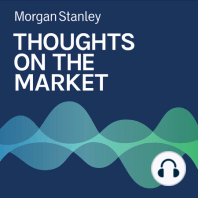4 min listen

Andrew Sheets: Can Bonds Once Again Play Defense?
Andrew Sheets: Can Bonds Once Again Play Defense?
ratings:
Length:
4 minutes
Released:
Apr 21, 2022
Format:
Podcast episode
Description
U.S. Treasury bonds have seen significant losses over the last six months, but looking forward investors may be able to use bonds to help balance their cross-asset portfolio in an uncertain market.-----Transcript-----Welcome to Thoughts on the Market. I'm Andrew Sheets, Chief Cross Asset Strategist for Morgan Stanley. Along with my colleagues bringing you a variety of perspectives, I'll be talking about trends across the global investment landscape and how we put those ideas together. It's Thursday, April 21st at 2pm in London. Like any good team, most balanced investment portfolios are built with offense and defense. Stocks are usually tasked to play that proverbial offensive role, producing the majority of inflation adjusted returns over the long run. But because these equity returns come with high volatility, investors count on bonds for defense, asking bonds to provide stability during times of uncertainty with a little bit of income along the way. At least that's the idea. And for most of the last 40 years, it's worked pretty well. But lately it really hasn't. The last 6 months have seen the worst total returns for U.S. 10 year Treasury bonds since 1980, with losses of more than 10%. Investors are likely looking at what they thought was the defense in their portfolio, with a mix of frustration and disbelief. On April 9th, we closed our long held underweight in U.S. bonds in our asset allocation and moved back up to neutral. Part of our reasoning was, very simply, that significantly higher yields now improved the forward looking return profile for bonds relative to other assets. But another part of our thinking is the belief that going forward, bonds will be more effective at providing defense for other parts of the portfolio. We think the path here is twofold. First, even as bonds have struggled year to date, the correlation of U.S. Treasuries to the S&P 500 is still roughly zero. That means stocks and bonds are still mostly moving independent of each other on a day to day basis, and supports the idea that bonds can lower overall volatility in a balanced portfolio if yields have now seen their major adjustment. Second, if we think about why bonds provide defense, it's that when the economy is poor, earnings and stock prices tend to go down. But a poor economy will also lead central banks to lower interest rates, which generally pushes bond prices up. Recently, this dynamic has struggled. Interest rates were so low, with so little in future rate increases expected that it was simply very hard for these rate expectations to decline if there was any bad economic data. But that's now changed and in a really big way. As recently as September of last year, markets were expecting just 25 basis points of interest rate increases from the Federal Reserve over the following 12 months. That number is now 275 basis points. If the U.S. economy unexpectedly slows or the recent rise in interest rates badly disrupt the housing market, two developments that the stock market might dislike, markets might start to think the Fed will do less. They will apply fewer rate increases and thus give support to bonds under this negative scenario. That would be a direct way that bonds would once again provide portfolio defense. Bonds still face challenges. But after a historically bad run, we are no longer underweight, and think they can once again prove useful within a broader cross asset portfolio. Thanks for listening! Subscribe to Thoughts on the Market on Apple Podcasts or wherever you listen and leave us to review. We'd love to hear from you.
Released:
Apr 21, 2022
Format:
Podcast episode
Titles in the series (100)
Mike Wilson: Weighing a Potential Fed Rate Cut by Thoughts on the Market